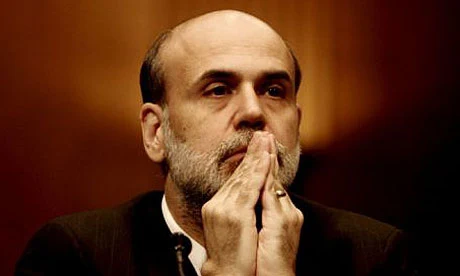At the 2014
Association of Financial Professionals Annual Conference in Washington D.C.
there were a number of incredibly insightful sessions. Perhaps the most interesting, at least on the
playbill, was the opening general session, which featured Ben Bernanke, the
former chairman of the Federal Reserve.
Bernanke is on tour
selling his upcoming 2015 book, a
memoir focused on his front row seat and actions during the Financial Crisis, for which he has received an advance of roughly $8 million.
He took the
opportunity to speak to over 5,000 members of the AFP, ourselves included, on
November 2, 2014 in Hall E of the Walter E. Washington Convention Center in
Washington, DC.
Bernanke addressed the
audience for approximately 30 minutes in what, for the most part, appeared to
be an apologetic for the actions of the Federal Reserve and other major actors
who found themselves in the middle of the Financial Crisis.
The final 60 minutes
of the session were much more interesting as the presentation changed in format
to that of an interview conducted by Bernanke's friend and former Princeton and
Federal Reserve Colleague, Alan S. Blinder. We will have more
insights from Blinder later in this series of AFP sessions on The Mint.
You can hear a large
portion of the conversation between Bernanke and Blinder by clicking on the
audio file at the link below:
On AIG: At minute 11:30 - Bernanke observes that the
only "True Bailout" performed by the government during the Financial
crisis was that of AIG. He observed that
AIG was like an unregulated hedge fund.
They doubled down by taking the cash they received from insuring the CDO's
against the risk of default and purchasing those same CDOs, essentially leaving
them with double exposure to the CDO market.
There was a sense that they were either not doing proper risk management
or that their actions were cynical.
Bernanke was most irritated by the AIG bailout of all of the actions
that were taken to stave off the Financial Crisis.
On His scariest moment during the crisis: The Tuesday that they
went to Congress to propose TARP when some of the largest firms under pressure.
Not unsurprisingly, Bernanke maintains
that TARP was good policy under the circumstances, and it gave the Fed the
legal authority to take many of the actions that, in Bernanke's opinion, staved
off the total collapse of the financial system.
On Lehman Brothers: There was no legal way
to save Lehman Brothers. At 7:00 he
addresses this. There was not buyer for
Lehman Brothers, and at the time, everybody was pulling away from Lehman, and
the firm would have collapsed with a week anyway.
On Quantitative Easing: At minute 16, Blinder
brings up the fact that Bernanke lobbied for a time for the series of programs
which were known as "Quantitative
easing" to be called "Credit easing" in order to distinguish it
from the actions previously taken by the Bank of Japan. The key difference being that while the Bank of
Japan pumped funds directly into the banks as reserves, the Fed was creating
liquidity to the system as a direct actor in the credit markets.
{Editor's Note: Those interested in satire can see our 2010 rendition of the Bare Naked Ladies hit If I had a Million Dollars as sung by Ben Bernanke, inspired by the early rounds of QE here}
{Editor's Note: Those interested in satire can see our 2010 rendition of the Bare Naked Ladies hit If I had a Million Dollars as sung by Ben Bernanke, inspired by the early rounds of QE here}
On the stock vs. flow theory: Around minute 21,
Blinder and Bernanke move into a conversation about the "stock"
versus the "flow" view of the Fed's balance sheet. The key difference being that those holding
the stock (meaning money stock) view look at the Fed's balance sheet as it
actually is to infer the effects that the Fed is having on monetary policy,
while those that hold to the "flow" view, namely almost everyone on
Wall Street, look at the Fed's buying and selling of assets to infer the
effects.
Bernanke is a strict
adherent to the stock view, and wonders what will happen if and when the Fed
looks to unwind its Balance sheet at a future date.
For those who followed
the Financial Crisis closely, Bernanke offers his own, less guarded take of the
events in the interview, which we assume will be a precursor for the contents
of his upcoming memoir.
One of the stark
takeaways that we are compelled to pass on to our readers is the
following: Bernanke's assertions that
the Fed did not have the legal authority to save the financial system until
TARP was passed. TARP was essentially
railroaded through Congress on the advice of then Treasury Secretary Henry
Paulson. While it may have been the
expedient thing to do at the time, it is unclear whether it was a good idea to
give the Federal Reserve and the Treasury (for they work in tangent with one
another) the authority to backstop the financial system.
It is a question that
is still waiting to be answered today, on the eve of yet another great
inflation event.
Stay Fresh!
David Mint
Key Indicators
for November 23, 2014
Corn Price per Bushel: $3.72
10 Yr US Treasury Bond: 2.32%
Bitcoin price in US: $367.00
FED Target Rate: 0.10%
Gold Price Per Ounce: $1,282
10 Yr US Treasury Bond: 2.32%
Bitcoin price in US: $367.00
FED Target Rate: 0.10%
Gold Price Per Ounce: $1,282
MINT Perceived Target
Rate*: 0.25%
Unemployment Rate: 5.8%
Inflation Rate (CPI): 0.0%
Dow Jones Industrial Average: 17,810
M1 Monetary Base: $2,758,900,000,000
Unemployment Rate: 5.8%
Inflation Rate (CPI): 0.0%
Dow Jones Industrial Average: 17,810
M1 Monetary Base: $2,758,900,000,000


No comments:
Post a Comment